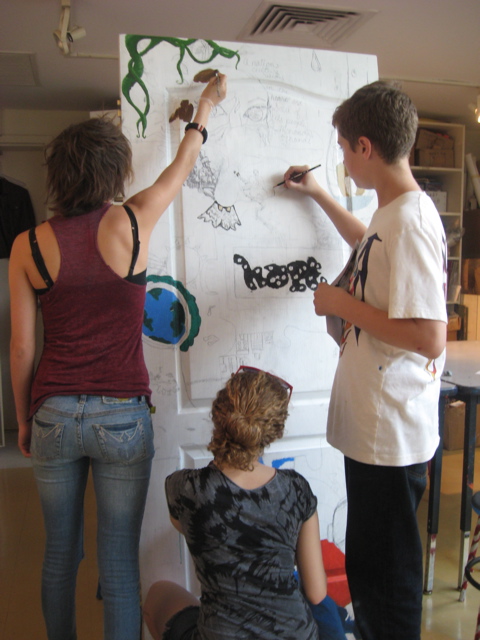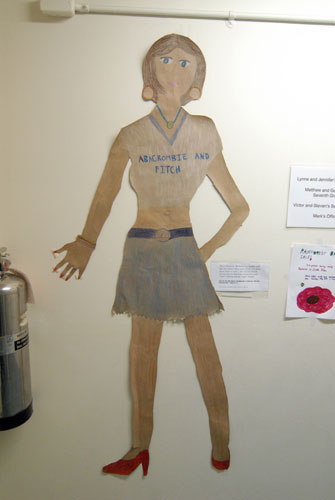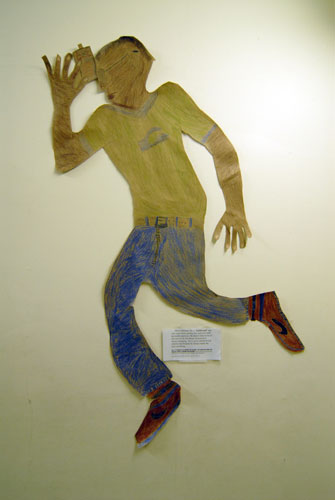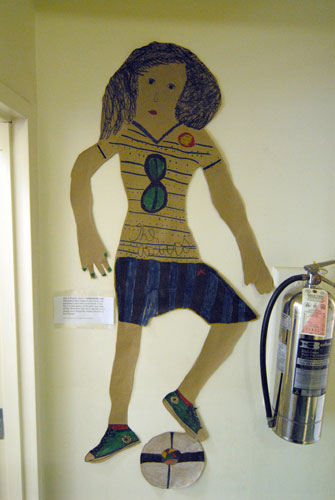All in a day . . .
Dear Families,
I the spirit of the rich Family Conference conversations taking place today throughout the building, I hope that the accounts given below shed a little more light on the many exciting things taking place in the middle school and provide you with some new entree points into dialog with your child about her/his school life.
Fifth graders are . . .
- continuing their deep reading of The Circuit and focusing on how to have rich discussions using prompts like:
- “I used to think… but now I think…”
- “This is similar to/ different from…”
- “I partly agree, but… because…”
- “I think this is important because…”.
- preparing for a literary essay and will be using their reading responses to develop a thesis.
- investigating why plant and animal domestication plays such an important role in tribes being able to settle in ongoing civilization simulation
- testing, recording and graphing their own walking and running paces as part of their of their study of patterns and change
- looking at examples of guardian figures from the ancient Sumerian culture as inspiration for clay relief tiles of their own Demon Spirit Guardians that students are making.
- preparing for a trip to the Metropolitan Museum of Art to view more art and artifacts created by the people of the ancient Near East.
- putting the finishing touches on their original music compositions, which have been composed for brass, piano and percussion instruments. Each piece began as a guided exploration of melody and students have gone on to incorporate an extensive list of important musical topics that a composer must consider such as, harmony, form, rhythm, sequences, dynamics and articulation. Near the end of the term in December, we will hold an informal rehearsal/performance of student work performed by musicians from NYU. Stay tuned for the date and time!
- starting a new unit on touch football with a focus on throwing and catching skills. Games are just around the corner.
Sixth graders are . . .
- deep into their reading of Parzival and Arabian Nights. This reading is also shaping writing that will eventually become their Medieval dramatic presentation. Current events projects are also just getting underway.
- talking about feudalism and have begun examining the rise of Christianity in Europe and the hierarchy of the church.
- working through a series of activities to better understand fraction operations. They began by adding and subtracting fractions and are now using brownie pans to help us understand how to multiply fractions. They are doing all this as well as making sure we are all using efficient strategies to operate with whole numbers.
- reflecting on their trip to the Cloisters museum (the medieval branch of the Metropolitan Museum of Art) as inspiration for the creation of their own illuminated letters. To create these letters, students are using quill pen and ink, watercolor paints and will be making their own gold paint to illuminate their letters.
- putting the finishing touches on their original music compositions, which have been composed for brass, piano and percussion instruments. Each piece began as a guided exploration of melody and students have gone on to incorporate an extensive list of important musical topics that a composer must consider such as, harmony, form, rhythm, sequences, dynamics and articulation. Near the end of the term in December, we will hold an informal rehearsal/performance of student work performed by musicians from NYU. Stay tuned for the date and time!
- starting a new unit on touch football with a focus on throwing and catching skills. Games are just around the corner
- participating in a series of “Olympic” PE challenges.
Seventh graders are . . .
- gearing up for the Colonial Museum by digging deeper into their research topics.
- finishing up their reading of Lois Lowry’s The Giver and thinking about the viability of a perfect community and the relationship between community and identity. This will culminate in a book critique and creative mini-exhibition
- learning about settlement in America in the early 1600’s and presently are looking at the establishment of community from the perspective of English settlers and Native Americans.
- engaging in literature circle work: one half of the class is reading The Lord of the Flies by William Golding, and the other half is reading Animal Farm by George Orwell.
- organizing and analyzing data needed to establish a simulated bike tour company. They’ve examined travel time, expenses, pricing and are now ready to synthesize information in the most concise form of equations. The next question to examine is, “How do we maximize profit?’ With the help of graphing calculators, it will be interesting to test the various variables involved in calculating profit.
- deconstructing electric motors in order to better understand how electrical energy is converted into mechanical energy. They will then design and build a working motor. Once they understand this concept, they will reverse the process to turn mechanical energy into electrical energy.
-
reviewing in French irregular verbs such as avoir, etre, and faire,
and interrogative expressions and applying them to everyday conversation; studying adjectives, describing famous individuals for a guessing game using descriptions, getting ready to start a project in which they will use adjectives and design an “ideal” model bedroom that they’ll build and use to write complex sentence structures. -
fully immersed in a food unit with new vocabulary related to food, condiments and utensils as well as continued practice with all regular and stem-change (”shoe”) present tense verb conjugations.
- navigating the ins and outs of self-defense in PE and learning how to release themselves from hand grips, chokes and bear hugs. They are also learning strategies for being safe on the streets.
- creating original PE games, which they are playing and Larry is then teaching some of the class favorites to the fifth grade.
Eighth graders are . . .
- examining the roots of the bias, discrimination and inequality that the Civil Rights Movement addressed by reading Julius Lester’s To Be a Slave, a collection of slaves in their own words, connected and commented upon by the author.
- examining linear functions and algebraic notation. They are writing equations, making tables and creating graphs that tell stories of things that grow at a constant rate. Taxi rides, t-shirt sales, bank accounts, walking rates and road races are just a few of the real life situations we have used in our investigations.The following are examples of questions they have answered through observing these patterns:
- How do you identify a linear function in a table, graph or equation?
- Can you give an example of an “everyday” linear function?
- What is true about the equations of parallel lines? perpendicular lines?
- What helps you to write the equation of a linear function?
- How do the characteristics of line show up in a table, graph or equation?
- using graphing calculators to enables them to explore answers to the above questions. They are unafraid to ask the “What if?” question because it’s so easy to readjust their thinking with these useful tools.
- designing and constructing Mousetrap Powered Vehicles to further advance their understanding of motion and the forces that enhance and oppose motion. They are incorporating what they know about motion, simple machines and energy transfers to do this. They will then use these vehicles to make predictions associated with Newton’s second law of motion. Knowing their vehicle’s weight and the force generated by the mousetrap, they will make predictions about the vehicle’s acceleration and then test them in the field.
- learning in French regular adjectives, clothing vocabulary and the new verbs porter, mettre, acheter. They are beginning a project using the future proche tense to describe an imaginary event that will be attended, doing some virtual shopping online in France to “buy” a new outfit for the event, and documenting their work.
- reading stories in their reader “Cuentos Simpaticos” and finishing a quick review of articles and adjective agreement in “Spanish Grammar.” They have also been reviewing present and past tense verbs so that they can begin a new past tense.
-
starting a painting project around the theme of favorite artists. The class has been looking at various artists and discussing different painting styles and art movements as a means to help students identify an artist on which they will focus. Students have selected their artists of inspiration and are in the process of creating an acrylic painting based on a particular piece of art or art movement.
-
exploring digital photography. The class looked at and discussed a variety of photographs before going outside to take their own. While walking around the neighborhood students were asked to think about photographing subjects from different vantage points. There were also asked to look for and photograph things such as lines, textures, colors, and shapes.
-
well into units on volleyball and soccer. We have worked on individual skills, partner skills and teamwork skills. With the favorable weather, we’ve been taking advantage of the turf field at JJ Walker for soccer. We have also started training for the first leg of our fitness test, where we work on long and short distance running, stretching, arm and core exercises.
Goings on in the Seventh And Eighth Grade Performing Arts Electives:
- Vocal Majors are working together in small groups, learning Broadway songs and presenting their arrangements to the class. The Vocal Majors and the MS Chorus are also preparing for the Winter Concert on Tuesday, Dec. 14th at 6:30PM at NYU. Vocal Minors have started creating music videos, where students pick a song, arrange and choreograph a presentation.
- In the dance majors classes, students have been spending one day a week learning modern dance technique, warm up exercises, and beginning to develop a dance sequence that incorporates modern dance, salsa, and capoeira. On the second day in the week students have been exploring choreography and composition and beginning to design short dance works.
- Students taking the major in drama have been exploring spontaneous improvisation using colors to represent emotions. Students are acting in scenes, and using a color chart to determine their character’s emotion. In the minor class, we are working on games and activities to develop confidence in the group before moving on to scene study.
-
The Instrumental Elective Class is progressing wonderfully! Students who are playing their instrument for the first time -trumpets, trombones and saxophones- are making excellent progress and the ensemble has been rehearsing a number of demanding numbers for the upcoming Winter Concert. In the digital music minor, students are becoming familiar with the keyboard and Garageband, which are the two main tools that we’ll use for composition.
In and outside of the library . . .
- booktalks have started in all classrooms, fifth graders have begun their introduction to MS research in anticipation of their civilizations project and seventh graders are deep into their colonial research process. The fifth grade Friday Nonfiction Book Nook has begun, as have read alouds in the sixth and seventh grade core classrooms.
All that in a day!





















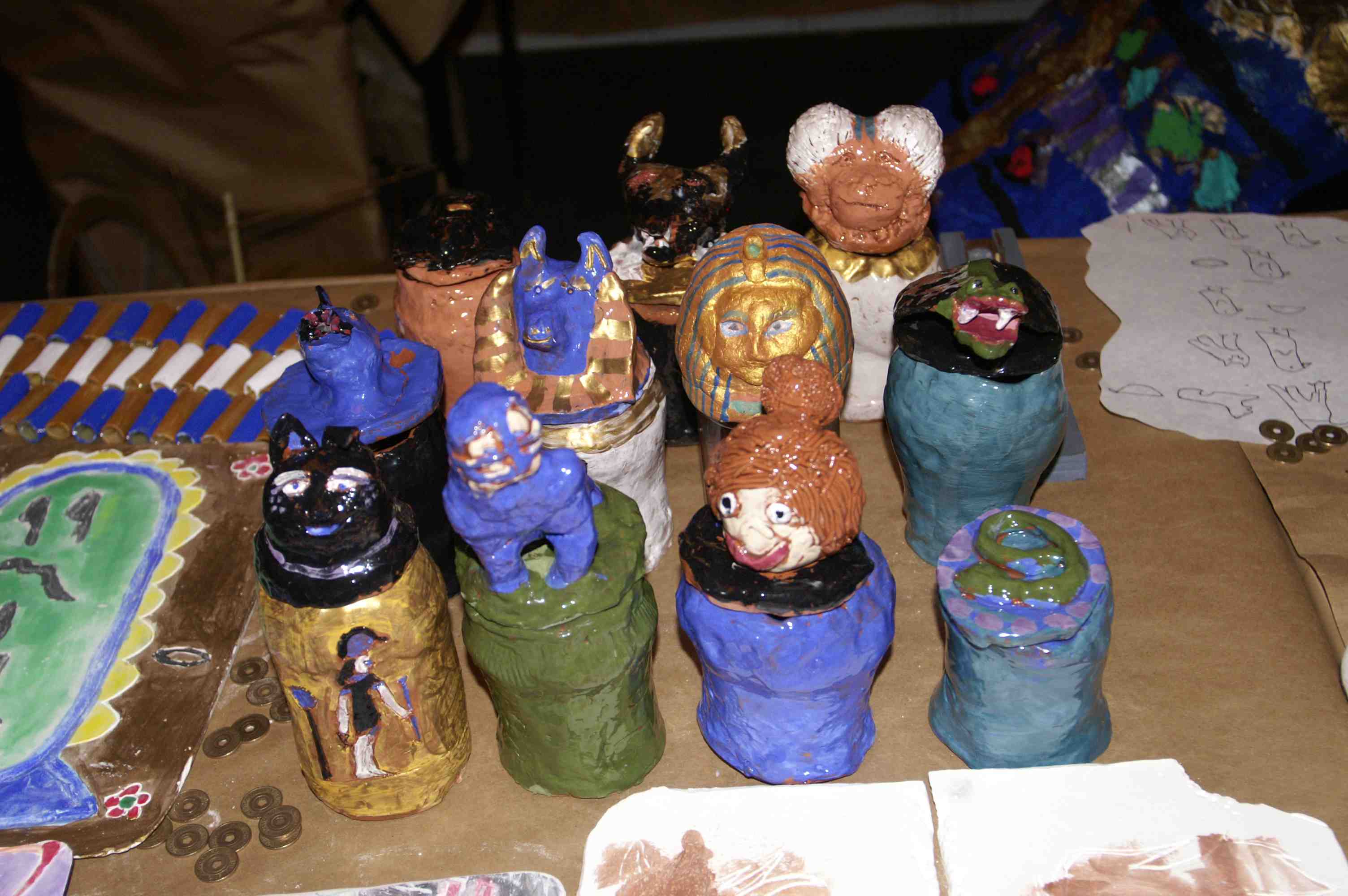
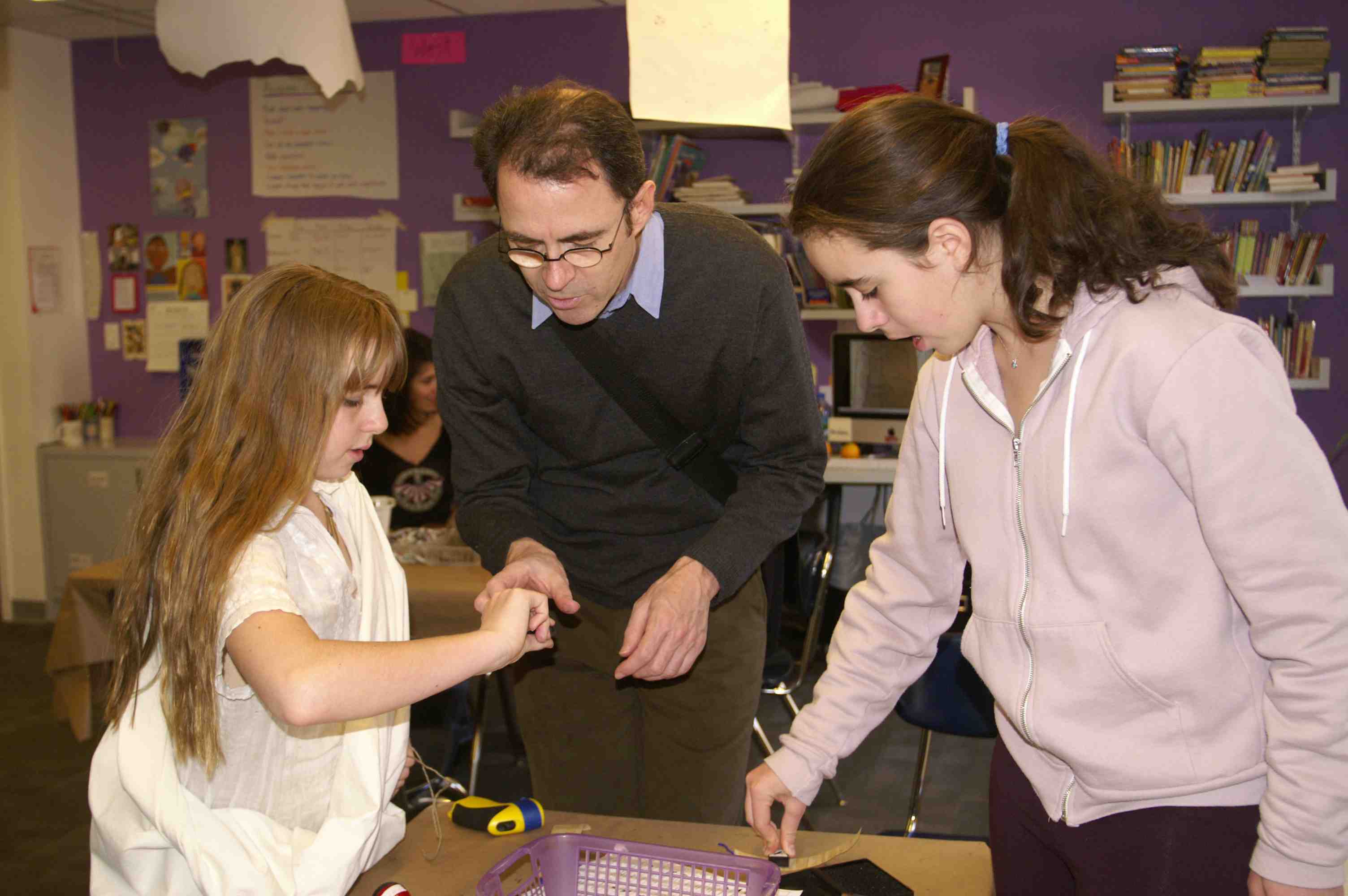
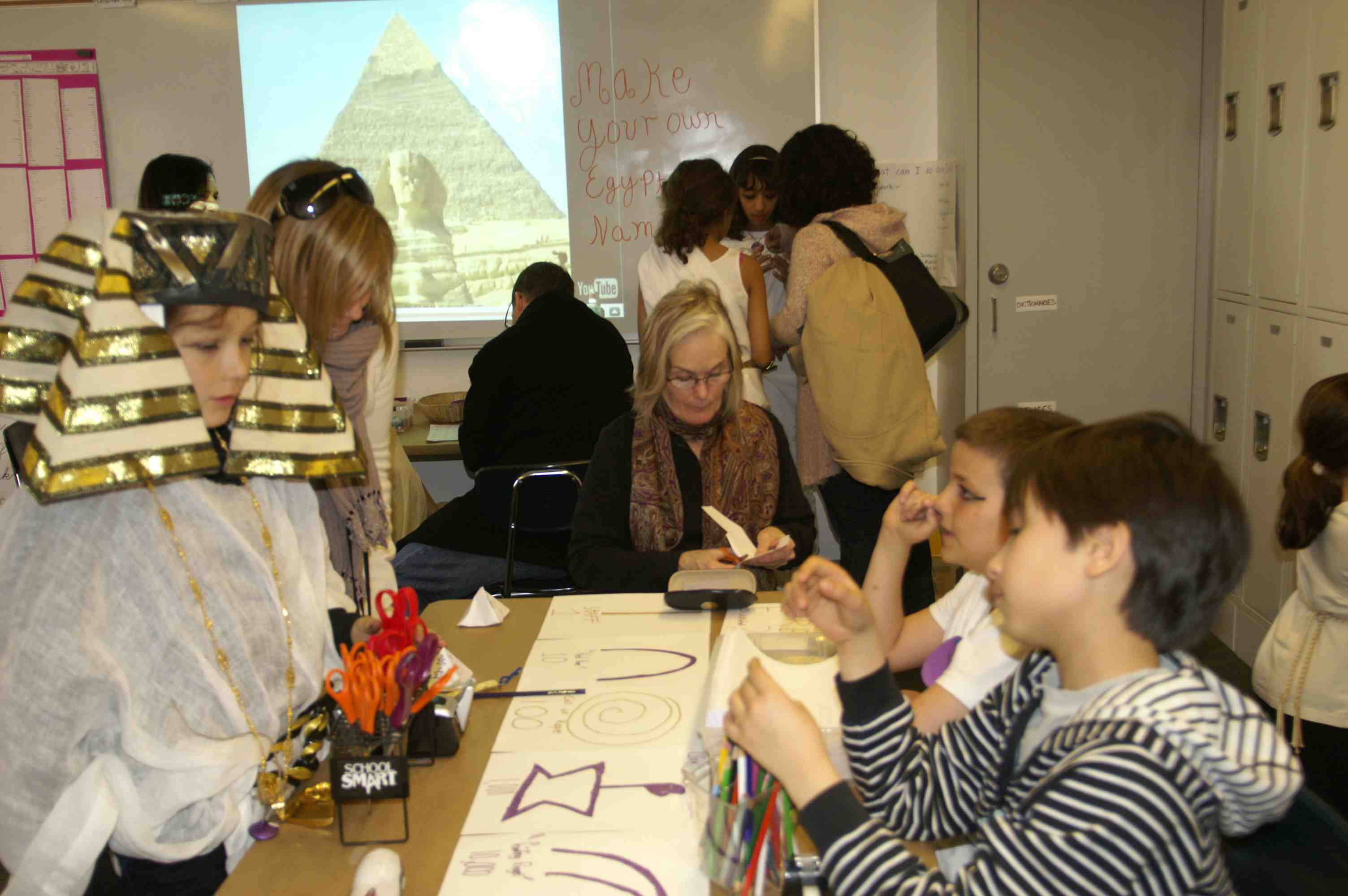


 Congratulations again to the members of the Middle School Robotics Teams who continued their winning ways with excellent performances at this past weekend’s FIRST Lego League Manhattan borough competition. Both teams have now qualified for the citywide competition that will take place at the Javits Center in March. The Advanced Team won 1st place in the Champion’s Award category. It “is the most prestigious award that any team can win. It celebrates the ultimate success of the FIRST mission and FLL values”. When the scores from their Project Presentation, Technical Presentation, Robot Performance and Teamwork were added they received the highest score out of the whole event. The Rookie Team won 2nd place in the Robot Design Award category where “judges look for teams whose robot stands out for innovation and dependability”. This is an incredible achievement for a group of kids in their first competition. Click
Congratulations again to the members of the Middle School Robotics Teams who continued their winning ways with excellent performances at this past weekend’s FIRST Lego League Manhattan borough competition. Both teams have now qualified for the citywide competition that will take place at the Javits Center in March. The Advanced Team won 1st place in the Champion’s Award category. It “is the most prestigious award that any team can win. It celebrates the ultimate success of the FIRST mission and FLL values”. When the scores from their Project Presentation, Technical Presentation, Robot Performance and Teamwork were added they received the highest score out of the whole event. The Rookie Team won 2nd place in the Robot Design Award category where “judges look for teams whose robot stands out for innovation and dependability”. This is an incredible achievement for a group of kids in their first competition. Click 










